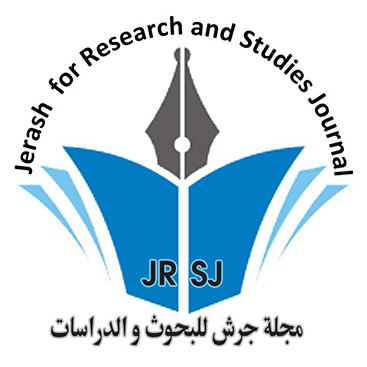Jerash for Research and Studies Journal مجلة جرش للبحوث والدراسات

Abstract
The main aim of this paper is to discuss Syntactic Extension (Al-Itsa) Rhetoric Semantic and Morphological Extension are beyond the scope of this paper. Therefore, the main topics of Syntactic Extension that will be discussed in this paper are: Adverbs Gerunds and qualitative Adjective similar to present active participle among other syntactic issue. The Syntactic Extension in adverbs, for example, will illustrate the opinions and differences of grammarians in using adverbs in the accusative case (subjunctive) similar to Direct Objects, or to delete the proposition. In addition, the paper discusses other issues such as adverbs in the genitive case, adverbs in the predication case and to separate between appositions. Syntactic Extension in the Infinitive and Oualitative Adjectives similar to Present Active Participle will be illustrated through examining the differences between grammarians. Four other Syntactic topics will be discussed in this paper as well. These topics are Syntactic Extension in bringing forward the Direct Object or the Predicate, Appositives in genitive and nominal cases, Concomitate Object and Causative Object Through illustrating the grammarians' opinions regarding the Syntactic Extension, it was crystal clear that there has been a difference between the two major schools in syntax in the Arab world regarding the Syntactic Extension: The Kufic School of Grammarians and The Basra Schools of Grammarians. The Kufic school of grammarians appears to prefer the use of Syntactic Extension as a choice open for writers whereas the Basra School of Grammarians seem to prefer the use of the Syntactic Extension as exception; i.e., not as a choice. Nevertheless, a very good number of Grammarians did not follow a particular trend in using the Syntactic Extension. They acting in an individual manner, used to shift between the Kufic and Basra schools of grammar The author of this paper, however, believes that Syntactic Extension in language depends on the availability of textual evidence from the Holy Qur'an, the
Prophetic Saying and Tradition and Poetry. But when these textual evidences are absent, the use of Syntactic Extension exception becomes acceptable
Recommended Citation
Saleh, Qasim
(2007)
"Breadth Syntax/ Ancient Times,"
Jerash for Research and Studies Journal مجلة جرش للبحوث والدراسات: Vol. 8:
Iss.
2, Article 2.
Available at:
https://digitalcommons.aaru.edu.jo/jpu/vol8/iss2/2

